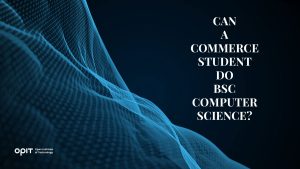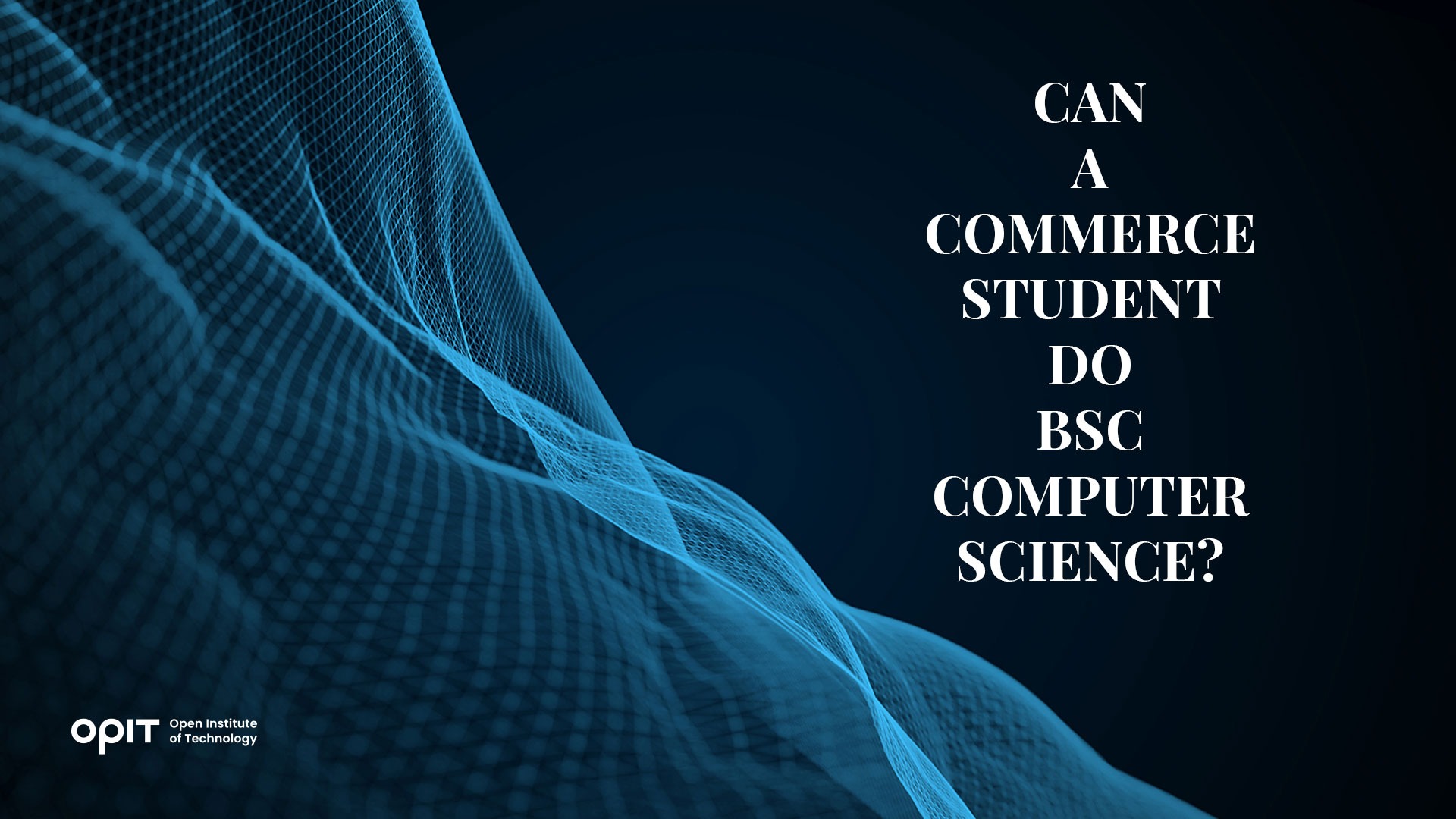Read the full article below (in Italian):


According to Data USA, degrees in the business field are among the most popular in the United States, with 840,116 degrees in this field alone being awarded in 2020. You went down the commerce route (meaning you have a grasp of business administration, accounting, and applied economics) and now you’re interested in practical applications of your knowledge.
With your commerce degree firmly under your belt, you may feel like a ship without a rudder – aimless and having no idea what direction to go. Happily, the tech field is ready and waiting for you, as a career in computer sciences may await. Here, we ask, “can a commerce student do BSc Computer Science?” The answer may surprise you, especially if you’re worried that a computer science degree’s eligibility requirements are outside the scope of what you learned in your commerce studies.
Background on Commerce and Computer Science
On the surface, commerce and computer science may seem like they go together as well as peanut butter and granite. But if you dig a little deeper into the scope of each subject, you start to realize that there’s more crossover than there first appears:
- Commerce – A degree in commerce gives you a firm grasp of the numbers that lie behind the scenes in a business, with banking, economics, and accounting all falling under your developing areas of expertise. Analytics is also a key part of these courses (especially in the research and data analyst fields), which is where we see some crossover with computer science.
- Computer Science – If commerce is all about the behind-the-scenes numbers in business, computer science handles what goes on under the hood in computing. Software development, data modeling, and analysis all fall under the computer science graduate’s remit, with the ability to pore through data to come to conclusions being essential to this technical subject.
It’s in the analysis that we start to see similarities between commerce and computer science emerge. Yes, commerce focuses more on the numbers behind businesses (and wider economic trends), but the ability to understand the data presented and report on what you see has applications in the computer science field. There’s not a direct crossover, as computer science will require you to learn the “language” in which computers speak, but they are many soft skills you develop in a commerce degree that apply to computer science.
Eligibility for BSc Computer Science
The key questions to ask when considering the issue of whether can commerce student do BSc Computer Science split into two categories:
- The general eligibility requirements to study a BSc in computer science
- Specific requirements that apply to commerce students
Eligibility Criteria for BSc Computer Science
BSc Computer Science degrees don’t require a great deal of computer know-how (though it helps), instead focusing on your grasp of mathematics. Requirements include the following:
- A high school diploma (or your country’s equivalent) that shows solid performance in mathematical subjects.
- Some degrees require you to achieve a specific Grade Point Average (GPA), though the specific GPA varies depending on where you apply.
- A high level of English proficiency, which can be measured using one (or both) of the following tests:
- IELTS – Get a minimum score between 6.0 and 7.0
- TOEFL – Get a minimum score between 90 and 100
Beyond these educational requirements, international students may need to submit copies of their passport and Visa, alongside certified academic transcripts to show they’ve achieved their country’s equivalents of the above grades. Not all courses require this of international students, with some online universities focusing more on your academic skills and less on your country of origin.
In terms of entrance exams, some colleges enforce computer science-specific exams (such as the CUET or CUCET), while others use NPATS or similar, more general exams, to determine proficiency.
Eligibility Criteria for Commerce Students
You may be standing at the starting line of your educational journey, meaning you’ve not yet applied to start your degree in commerce. First, congratulations on thinking so far ahead that you’re wondering “Can a commerce student do BSc Computer Science?” And second, you need to know what high school subjects help you get onto this degree path.
Commerce is a form of business degree, meaning any high school subjects that apply to the economic world help. Subjects like math, finance, economics, and foreign languages are obvious choices. The likes of marketing and computer applications also help (with the latter also laying some groundwork for your later computer science studies.
Much like computer science, you’ll likely have to take an entrance exam when applying to study commerce at most universities. The CSEET, CUET, and SET are common choices, with the first of these exams focusing specifically on those who study commerce to work as company secretaries.
The Possibility of Flexible Eligibility Criteria
Not all colleges require you to take entrance exams, with some even using broader strokes for their eligibility requirements to the point where they provide flexibility for both commerce and computer science students.
Colleges with open curriculums (such as Brown University and Hamilton College) offer more freedom in terms of what you study, with their entry requirements being more flexible as a result. Online institutions, such as the Open Institute of Technology (OPIT) may also offer more flexible entry criteria, sometimes allowing you to transfer credit from one course to another. That type of credit transfer may be ideal for you if you start a degree in commerce only to later decide to go down the computer science route.
Career Prospects for Commerce Students in Computer Science
When it comes to careers for those who hold computer science degrees, the obvious heavy-hitters are software and web development, IT management, and systems architecture. There are also exciting careers in the emerging AI fields that take full advantage of the technical skills you’ll develop as part of a BSc in computer science.
As for the career crossover between commerce and computer science, the key is to think about the skills that a commerce degree gives you that can apply in the computing field. Such skills include the following:
- Analytical Skills – Much like computer science, commerce is all about analyzing the data presented so you can report (and leverage) it for other purposes. Your ability to sit down and pore through the numbers will take you a long way in a computer-related role.
- Problem-Solving Skills – Closely linked to analytical skills, the ability to solve problems requires you to see the data at hand and come up with solutions while accounting for any restrictions presented. In creating commerce models, those restrictions may relate to budget and competencies, while computer science asks you to solve problems while taking system capabilities and limitations into account.
- Communication and Teamwork – Though often considered soft skills (as opposed to the “hard” technical skills you learn in a commerce degree), communication and teamwork are vital. If you need proof, try to work alone in any technical career and you’ll see why it’s so crucial to have these skills.
Potential Career Paths for Commerce Students with a BSc in Computer Science
With so much crossover potential between commerce and computer science, it’s clear that the answer to the question can a commerce student do BSc Computer Science is a resounding “yes.” And once you’ve completed your studies, several career paths await:
- Data Analyst – Reviewing data to find insights (be that into businesses or computer systems) are part of the remit for a data analyst. This role is all about problem-solving, which is a skill you’ll develop in abundance as a commerce and computer science student.
- Business Analyst – Take the ability to gather insights that is required of a data analyst and apply it specifically to areas of improvement in a business to become a business analyst. You’ll combine technical knowledge of a company’s inner workings with complex financial (and computational) models.
- IT Consultant – More computer science-centric than commerce-focused, IT consultants deal with the hows and whys of the computer networks businesses build. Your commerce skills will still come into play though, particularly when explaining how IT benefits businesses financially.
- Financial Technology Specialist – Combining the best of both worlds, this role combines the accounting skills you develop studying commerce with the technical ability needed to understand software and its functions.
Challenges and Considerations for Commerce Students
Though it’s possible for a commerce student to study (and succeed in) computer science, there are some challenges to consider.
The Technical Nature of Computer Science
As you learn the language of numbers in a commerce degree, so must you learn the language of machines when studying computer science. Getting to grips with the lingo (not to mention coding) can present a challenge to more business-minded students.
Balancing Your Workload
There’s an old saying that goes “Don’t burn the candle at both ends,” which is a warning not to pack too much onto your work plate. If you study commerce and computer science simultaneously, there’s a risk you may push yourself too far. Avoiding burnout requires finding the balance between your studies and personal time.
Networking and Practical Experience
As a commerce student, you understand that the world of business is as much about who you know as what you know. Finding the right people to take a chance on you, thus giving you practical experience, can be tough. But when armed with a pair of degrees in subjects that complement one another, you’re in a better position to build connections with people who can help you go far.
From Commerce to Computing – Is It Right for You?
So, can a commerce student do BSc Computer Science?
The answer isn’t just “yes,” but that it’s actually a great direction to go. Where a commerce degree equips you with a nice mix of technical knowledge and soft skills, a computer science course gives you even more practical knowledge that allows you to enter more specialized fields. However, your interest in each subject plays a role, as your ability (and passion) for studying hinges on your desire to dig into the more technical world of computing.
Assuming you have a genuine interest (and meet the appropriate eligibility criteria), supplementing your commerce studies with computer science can open up many career paths.
Related posts

Source:
- Agenda Digitale, published on June 16th, 2025
By Lokesh Vij, Professor of Cloud Computing Infrastructure, Cloud Development, Cloud Computing Automation and Ops and Cloud Data Stacks at OPIT – Open Institute of Technology
NIST identifies five key characteristics of cloud computing: on-demand self-service, network access, resource pooling, elasticity, and metered service. These pillars explain the success of the global cloud market of 912 billion in 2025
Read the full article below (in Italian):

You’ve probably seen two of the most recent popular social media trends. The first is creating and posting your personalized action figure version of yourself, complete with personalized accessories, from a yoga mat to your favorite musical instrument. There is also the Studio Ghibli trend, which creates an image of you in the style of a character from one of the animation studio’s popular films.
Both of these are possible thanks to OpenAI’s GPT-4o-powered image generator. But what are you risking when you upload a picture to generate this kind of content? More than you might imagine, according to Tom Vazdar, chair of cybersecurity at the Open Institute of Technology (OPIT), in a recent interview with Wired. Let’s take a closer look at the risks and how this issue ties into the issue of responsible artificial intelligence.
Uploading Your Image
To get a personalized image of yourself back from ChatGPT, you need to upload an actual photo, or potentially multiple images, and tell ChatGPT what you want. But in addition to using your image to generate content for you, OpenAI could also be using your willingly submitted image to help train its AI model. Vazdar, who is also CEO and AI & Cybersecurity Strategist at Riskoria and a board member for the Croatian AI Association, says that this kind of content is “a gold mine for training generative models,” but you have limited power over how that image is integrated into their training strategy.
Plus, you are uploading much more than just an image of yourself. Vazdar reminds us that we are handing over “an entire bundle of metadata.” This includes the EXIF data attached to the image, such as exactly when and where the photo was taken. And your photo may have more content in it than you imagine, with the background – including people, landmarks, and objects – also able to be tied to that time and place.
In addition to this, OpenAI also collects data about the device that you are using to engage with the platform, and, according to Vazdar, “There’s also behavioral data, such as what you typed, what kind of image you asked for, how you interacted with the interface and the frequency of those actions.”
After all that, OpenAI knows a lot about you, and soon, so could their AI model, because it is studying you.
How OpenAI Uses Your Data
OpenAI claims that they did not orchestrate these social media trends simply to get training data for their AI, and that’s almost certainly true. But they also aren’t denying that access to that freely uploaded data is a bonus. As Vazdar points out, “This trend, whether by design or a convenient opportunity, is providing the company with massive volumes of fresh, high-quality facial data from diverse age groups, ethnicities, and geographies.”
OpenAI isn’t the only company using your data to train its AI. Meta recently updated its privacy policy to allow the company to use your personal information on Meta-related services, such as Facebook, Instagram, and WhatsApp, to train its AI. While it is possible to opt-out, Meta isn’t advertising that fact or making it easy, which means that most users are sharing their data by default.
You can also control what happens with your data when using ChatGPT. Again, while not well publicized, you can use ChatGPT’s self-service tools to access, export, and delete your personal information, and opt out of having your content used to improve OpenAI’s model. Nevertheless, even if you choose these options, it is still worth it to strip data like location and time from images before uploading them and to consider the privacy of any images, including people and objects in the background, before sharing.
Are Data Protection Laws Keeping Up?
OpenAI and Meta need to provide these kinds of opt-outs due to data protection laws, such as GDPR in the EU and the UK. GDPR gives you the right to access or delete your data, and the use of biometric data requires your explicit consent. However, your photo only becomes biometric data when it is processed using a specific technical measure that allows for the unique identification of an individual.
But just because ChatGPT is not using this technology, doesn’t mean that ChatGPT can’t learn a lot about you from your images.
AI and Ethics Concerns
But you might wonder, “Isn’t it a good thing that AI is being trained using a diverse range of photos?” After all, there have been widespread reports in the past of AI struggling to recognize black faces because they have been trained mostly on white faces. Similarly, there have been reports of bias within AI due to the information it receives. Doesn’t sharing from a wide range of users help combat that? Yes, but there is so much more that could be done with that data without your knowledge or consent.
One of the biggest risks is that the data can be manipulated for marketing purposes, not just to get you to buy products, but also potentially to manipulate behavior. Take, for instance, the Cambridge Analytica scandal, which saw AI used to manipulate voters and the proliferation of deepfakes sharing false news.
Vazdar believes that AI should be used to promote human freedom and autonomy, not threaten it. It should be something that benefits humanity in the broadest possible sense, and not just those with the power to develop and profit from AI.
Responsible Artificial Intelligence
OPIT’s Master’s in Responsible AI combines technical expertise with a focus on the ethical implications of AI, diving into questions such as this one. Focusing on real-world applications, the course considers sustainable AI, environmental impact, ethical considerations, and social responsibility.
Completed over three or four 13-week terms, it starts with a foundation in technical artificial intelligence and then moves on to advanced AI applications. Students finish with a Capstone project, which sees them apply what they have learned to real-world problems.
Have questions?
Visit our FAQ page or get in touch with us!
Write us at +39 335 576 0263
Get in touch at hello@opit.com
Talk to one of our Study Advisors
We are international
We can speak in:


